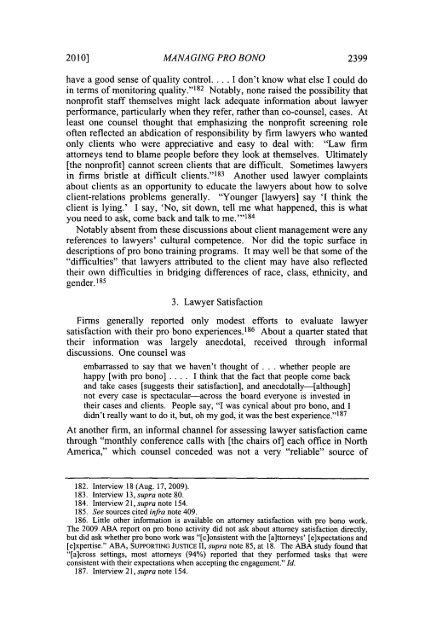Law for The Poor
Law for The Poor
Law for The Poor
Create successful ePaper yourself
Turn your PDF publications into a flip-book with our unique Google optimized e-Paper software.
2010] MANAGING PRO BONO<br />
2399<br />
have a good sense of quality control .... I don't know what else I could do<br />
in terms of monitoring quality."' 182 Notably, none raised the possibility that<br />
nonprofit staff themselves might lack adequate in<strong>for</strong>mation about lawyer<br />
per<strong>for</strong>mance, particularly when they refer, rather than co-counsel, cases. At<br />
least one counsel thought that emphasizing the nonprofit screening role<br />
often reflected an abdication of responsibility by firm lawyers who wanted<br />
only clients who were appreciative and easy to deal with: "<strong>Law</strong> firm<br />
attorneys tend to blame people be<strong>for</strong>e they look at themselves. Ultimately<br />
[the nonprofit] cannot screen clients that are difficult, Sometimes lawyers<br />
in firms bristle at difficult clients."' 183 Another used lawyer complaints<br />
about clients as an opportunity to educate the lawyers about how to solve<br />
client-relations problems generally. "Younger [lawyers] say 'I think the<br />
client is lying.' I say, 'No, sit down, tell me what happened, this is what<br />
you need to ask, come back and talk to me."" 184<br />
Notably absent from these discussions about client management were any<br />
references to lawyers' cultural competence. Nor did the topic surface in<br />
descriptions of pro bono training programs. It may well be that some of the<br />
"difficulties" that lawyers attributed to the client may have also reflected<br />
their own difficulties in bridging differences of race, class, ethnicity, and<br />
gender. 185<br />
3. <strong>Law</strong>yer Satisfaction<br />
Firms generally reported only modest ef<strong>for</strong>ts to evaluate lawyer<br />
satisfaction with their pro bono experiences. 1 86 About a quarter stated that<br />
their in<strong>for</strong>mation was largely anecdotal, received through in<strong>for</strong>mal<br />
discussions. One counsel was<br />
embarrassed to say that we haven't thought of ... whether people are<br />
happy [with pro bono] .... I think that the fact that people come back<br />
and take cases [suggests their satisfaction], and anecdotally--[although]<br />
not every case is spectacular-across the board everyone is invested in<br />
their cases and clients. People say, "I was cynical about pro bono, and I<br />
didn't really want to do it, but, oh my god, it was the best experience." 187<br />
At another firm, an in<strong>for</strong>mal channel <strong>for</strong> assessing lawyer satisfaction came<br />
through "monthly conference calls with [the chairs of] each office in North<br />
America," which counsel conceded was not a very "reliable" source of<br />
182. Interview 18 (Aug. 17, 2009).<br />
183. Interview 13, supra note 80.<br />
184. Interview 21, supra note 154.<br />
185. See sources cited infra note 409.<br />
186. Little other in<strong>for</strong>mation is available on attorney satisfaction with pro bono work.<br />
<strong>The</strong> 2009 ABA report on pro bono activity did not ask about attorney satisfaction directly,<br />
but did ask whether pro bono work was "[c]onsistent with the [a]ttomeys' [e]xpectations and<br />
[e]xpertise." ABA, SUPPORTING JUSTICE II, supra note 85, at 18. <strong>The</strong> ABA study found that<br />
"[a]cross settings, most attorneys (94%) reported that they per<strong>for</strong>med tasks that were<br />
consistent with their expectations when accepting the engagement." Id.<br />
187. Interview 21, supra note 154.

















